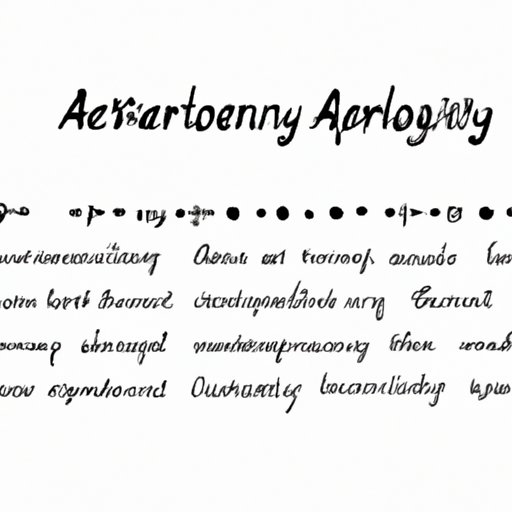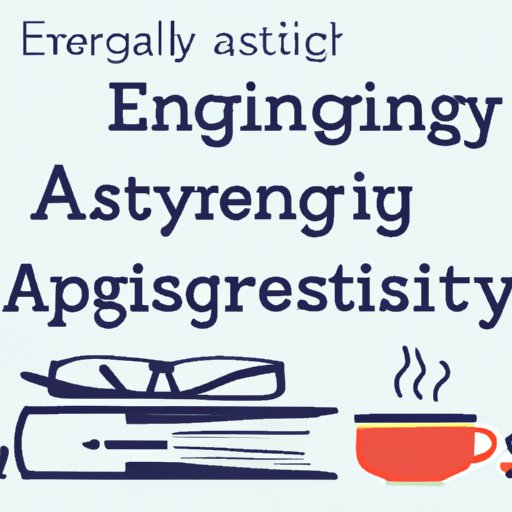Introduction
Writing is a powerful form of communication that can be used to express ideas, tell stories, and evoke emotion. An important tool for writers is agency—the ability of characters to make choices and take action. In this article, we will explore what agency is in writing, how it relates to other literary elements, and how it can be used to enhance the narrative, create a sense of realism, and increase reader engagement.
Exploring the Definition of Agency in Writing
Before we can understand the role of agency in writing, it’s important to understand what it means. Agency is defined as “the capacity of individuals to act independently and to make their own free choices.” In literature, it is the power of characters to make decisions, take action, and determine their own fate. It is often used to drive the plot forward and create tension and suspense.
Answering Questions about Agency in Writing
Now that we have a better understanding of what agency is, let’s explore some common questions about it.
What is the Purpose of Agency in Writing?
The purpose of agency in writing is to give characters autonomy and independence. It allows them to make decisions, take action, and influence the plot. It also helps to create tension and suspense, as the reader is not sure what the outcome of the character’s decisions will be. Additionally, it can make the story more engaging and realistic by allowing characters to make mistakes and face consequences.
How Can Writers Create Effective Agency in Their Work?
Writers can create effective agency in their work by giving characters autonomy and allowing them to make their own decisions. This can be done by providing characters with choices and allowing them to take action based on those choices. Additionally, writers should consider the consequences of those choices and how they will affect the plot. This will help create tension and suspense, as well as a sense of realism.
What are Some Common Mistakes Writers Make when Incorporating Agency?
One common mistake writers make when incorporating agency is making all of the characters’ decisions for them. This can make the characters seem one-dimensional and uninteresting. Additionally, writers should avoid making all of the characters’ choices the same or predictable. This can lead to a lack of tension and suspense, as the reader will know what to expect. Lastly, writers should strive to make the consequences of characters’ decisions meaningful and impactful.
Examining Examples of Agency in Writing
Now that we have discussed the purpose of agency in writing and how to create effective agency, let’s look at some examples.
Short Story Example
In the short story “The Lottery” by Shirley Jackson, the protagonist, Tessie Hutchinson, is faced with a difficult decision: whether to participate in the annual lottery. She ultimately decides to do so, despite her reservations. This decision has major consequences, as she is chosen as the winner and must endure the ritual sacrifice. This example illustrates the power of agency and how it can be used to drive the plot forward and create tension and suspense.
Novel Example
In Harper Lee’s novel To Kill a Mockingbird, the protagonist, Scout Finch, is faced with many difficult decisions throughout the course of the story. She must decide whether to stand up for what she believes in despite the risks, whether to accept people who are different from her, and whether to follow her conscience or the law. These decisions shape the plot and are integral to the development of Scout’s character.
Poem Example
In the poem “The Road Not Taken” by Robert Frost, the speaker is faced with a difficult decision: whether to take the road less traveled or the road more traveled. He ultimately decides to take the road less traveled, which symbolizes his desire to be independent and make his own decisions. This example demonstrates how agency can be used to illustrate themes and add depth to a work of literature.

Analyzing the Benefits of Agency in Writing
Now that we have seen some examples of agency in writing, let’s examine the benefits it can provide.
Enhancing the Narrative
One of the main benefits of agency in writing is that it can enhance the narrative. By giving characters autonomy and allowing them to make their own decisions, writers can create tension and suspense, as the reader is left wondering what will happen next. Additionally, it can make the story more engaging and realistic, as characters are faced with difficult choices and must deal with the consequences.
Creating a Sense of Realism
Another benefit of agency in writing is that it can create a sense of realism. By allowing characters to make mistakes and face consequences, readers can relate to the characters and become more invested in the story. Additionally, it can make the story more believable, as characters are not just passive participants but active agents in their own fate.
Increasing Reader Engagement
Finally, agency in writing can increase reader engagement. By giving characters autonomy, writers can create tension and suspense, as readers are eager to find out what will happen next. Additionally, it can make the story more compelling and relatable, as readers can identify with the characters and the choices they make.

Investigating the Role of Agency in Writing
Now that we have discussed the benefits of agency in writing, let’s investigate its role in storytelling.
How Does Agency Impact Character Development?
Agency can have a major impact on character development. By giving characters autonomy and allowing them to make their own decisions, writers can create dynamic and interesting characters. Additionally, it can help to illustrate themes and add depth to the story, as characters are faced with difficult choices and must grapple with the consequences.
What are the Different Ways Writers Can Show Agency?
There are several ways writers can show agency in their work. One way is through dialogue, as characters can express their opinions and feelings. Another way is through action, as characters can take steps to achieve their goals. Finally, writers can use internal monologue to illustrate characters’ thoughts and motivations.
How Can Writers Use Agency to Influence Plot?
Writers can use agency to influence plot in several ways. By giving characters autonomy, writers can create tension and suspense, as readers are not sure what the outcome of the characters’ decisions will be. Additionally, it can be used to create conflict and drive the plot forward, as characters must grapple with the consequences of their decisions. Finally, it can be used to illustrate themes and add depth to the story.

Evaluating Different Types of Agency in Writing
Now that we have discussed the role of agency in writing, let’s evaluate different types of agency.
Internal vs. External Agency
The first type of agency is internal agency, which is the ability of characters to make their own decisions and take action. External agency, on the other hand, is the ability of external forces to influence characters’ decisions. Both types of agency can be used to create tension and suspense and influence the plot.
Positive vs. Negative Agency
Another type of agency is positive agency, which is the ability of characters to make positive decisions and take positive action. Negative agency, on the other hand, is the ability of characters to make negative decisions and take negative action. Both types of agency can be used to create tension and suspense and illustrate themes.
Intentional vs. Unintentional Agency
The final type of agency is intentional agency, which is the ability of characters to make conscious decisions and take intentional action. Unintentional agency, on the other hand, is the ability of characters to make unconscious decisions and take unintentional action. Both types of agency can be used to create tension and suspense and influence the plot.
Conclusion
In conclusion, agency is an important tool for writers. It is the ability of characters to make decisions, take action, and determine their own fate. It can be used to enhance the narrative, create a sense of realism, and increase reader engagement. Additionally, it can have a major impact on character development and influence the plot. There are several types of agency, including internal, external, positive, negative, intentional, and unintentional. With this knowledge, writers can create effective agency in their work and create compelling and engaging stories.
(Note: Is this article not meeting your expectations? Do you have knowledge or insights to share? Unlock new opportunities and expand your reach by joining our authors team. Click Registration to join us and share your expertise with our readers.)
